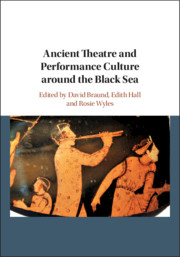Book contents
- Ancient Theatre and Performance Culture around the Black Sea
- Frontispiece
- Ancient Theatre and Performance Culture around the Black Sea
- Copyright page
- Contents
- Figures
- Notes on Contributors
- Preface
- Abbreviations
- Map
- Part I Approaches
- Part II Places
- Part III Plays
- Part IV Performative Presences
- 16 Music and Performance among Greeks and Scythians
- 17 A New Mask and Musical Instruments from the Eastern Bosporus
- 18 The Cult of Dionysus in Ancient Georgia
- 19 Paratheatrical Performances in the Bosporan Kingdom
- 20 Historiography and Theatre: The Tragedy of Scythian King Skyles
- 21 Life Trajectories: Iphigenia, Helen and Achilles on the Black Sea
- Epilogue: Dancing around the Black Sea: Xenophon, Pseudo-Scymnus and Lucian’s Bacchants
- References
- Black Sea Index
16 - Music and Performance among Greeks and Scythians
from Part IV - Performative Presences
Published online by Cambridge University Press: 12 November 2019
- Ancient Theatre and Performance Culture around the Black Sea
- Frontispiece
- Ancient Theatre and Performance Culture around the Black Sea
- Copyright page
- Contents
- Figures
- Notes on Contributors
- Preface
- Abbreviations
- Map
- Part I Approaches
- Part II Places
- Part III Plays
- Part IV Performative Presences
- 16 Music and Performance among Greeks and Scythians
- 17 A New Mask and Musical Instruments from the Eastern Bosporus
- 18 The Cult of Dionysus in Ancient Georgia
- 19 Paratheatrical Performances in the Bosporan Kingdom
- 20 Historiography and Theatre: The Tragedy of Scythian King Skyles
- 21 Life Trajectories: Iphigenia, Helen and Achilles on the Black Sea
- Epilogue: Dancing around the Black Sea: Xenophon, Pseudo-Scymnus and Lucian’s Bacchants
- References
- Black Sea Index
Summary
The Greeks who established the first colonies on the north coast of the Black Sea from the later seventh century BC brought musical traditions with them into their new world. We know a good deal about the substantial role of music in the everyday life, festivals and rituals of the cities from which they had come. Moreover, there was a close association between their music and dance and their broader literary culture. At the same time, the local populations of this new colonial world also had their own traditions of music and dance which, as far as we can tell, were substantially different from those of the Greek settlers. Unfortunately, no detailed study has ever been attempted on the interplay of these Greek and local traditions, nor on the range of literary and archaeological evidence available on these matters. On the other hand, however, these issues have often received passing attention in broader studies, as, perhaps most notably, in the works of M. V. Skrzhinskaya on the festivals of the cities of the north Pontic coast. A substantial treatment of music, dance and theatre in the region is also to be found in the work of I. I. Vdovichenko. A great deal is also to be found on the subject in a range of publications, catalogues and so on, concerning the archaeological discovery of ancient instruments and their depiction on different objects. In general, it is to be understood that, while we can put together a fairly clear picture of the music and dance practised in the Greek cities, we are in a much less strong position to appreciate the nature of those traditions among the non-Greeks of the region. In their case, we rely on much less evidence and an admixture of inferences and comparisons from ethnographical data and the like. The goal of the present short overview is to make a preliminary attempt at assembling the archaeological evidence particularly for the music and dance of the region among both Greeks and non-Greeks, separately and perhaps also together.
- Type
- Chapter
- Information
- Ancient Theatre and Performance Culture Around the Black Sea , pp. 331 - 361Publisher: Cambridge University PressPrint publication year: 2019



